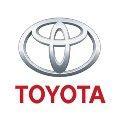A Rough Road for Toyota
This is the VOA Special English Economics Report.
Toyota became the world's largest automaker in two thousand eight. But after years of building loyalty, the Japanese company may have put its quality brand name at risk, at least temporarily.
Toyota is recalling millions of cars and trucks around the world because of cases where vehicles have sped up unexpectedly. Last August, a driver in California was unable to stop. The crash killed him and three of his family members.
Toyota says the problem is rare and caused by accelerator pedals becoming stuck open. On January twenty-sixth, the company suspended sales of eight of its top-selling vehicles in the United States, its largest market. Toyota dealers have been receiving parts to make repairs.
General Motors and Ford both reported increased sales in January. But Toyota sales in the United States have fallen, and so has its stock price. Toyota says it expects costs and lost sales from its recent safety recalls to total two billion dollars by the end of March.
Louis Lataif spent twenty-seven years in the car industry at Ford. Now he is dean of the School of Management at Boston University.
LOUIS LATAIF: "It's Toyota's biggest such recall. It's voluntary incidentally, it's not mandated. So, in that respect, they are doing something fairly bold, namely, taking the hit of shutting production and correcting the vehicles that are in inventory on which they have stopped sales." A recall late last year involved floor mats that Toyota said could cause the accelerator to get stuck. One of the vehicles in the floor mat recall was the Prius, the world's top selling hybrid. Now American officials are investigating the brake system on the twenty ten Prius. The Transportation Department says it has received more than one hundred twenty reports, including reports of four crashes.
Toyota says it found a software problem that could briefly affect the "feel" of the anti-lock brakes on rough or slippery roads. It says it fixed the brake problem last month.
But a growing number of legal cases claim Toyota knew for a long time about the sudden acceleration issue with other vehicles. The problem reportedly has led to more than eight hundred crashes and nineteen deaths in the past ten years. Congress is preparing for hearings.
Greg Bonner is a marketing professor at Villanova University. He says to regain trust, Toyota will have to make public everything it knows about the problems and show it accepts responsibility.
The recall has also intensified questions about all the computer control systems used in modern cars.
And that's the VOA Special English Economics Report, written by Mario Ritter. I'm Steve Ember.

